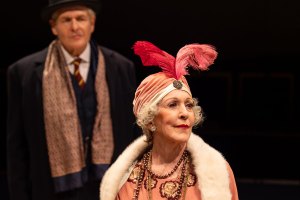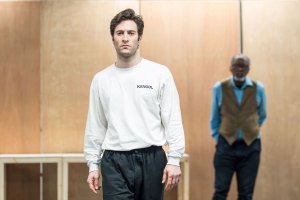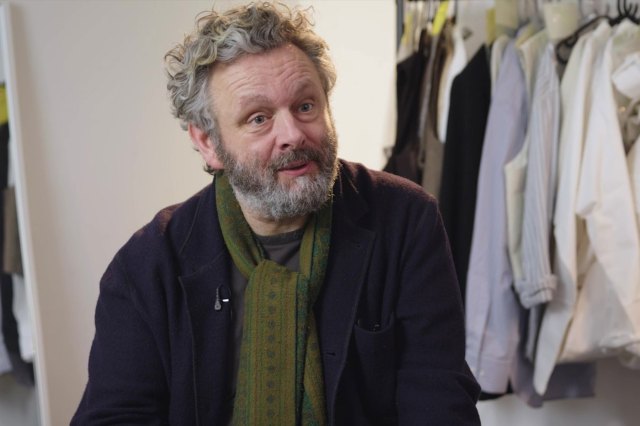20 Questions With…Marc Salem
Professor Marc Salem – who returns to London next week with his stage show Mind Games – offers some tips for budding mind readers, reveals the national differences between his audiences & that it’s a small step from lecturer to entertainer.
As an academic, Marc Salem holds advanced degrees from the University of Pennsylvania and New York University, and has been on the faculty of several major universities. An authority on non-verbal communication, Salem has travelled the globe exploring the mind and its potential. How the mind creates reality and meaning has been his major focus. He was a director of research at Sesame Street, studying the development and nature of the mental process.
As an entertainer, Salem has performed around the world with his show which has appeared in four incarnations: Mind Games, Mind Games 2, Mind Games All That Jazz and Mark Salem: Out of His Mind.
His first show Mind Games enjoyed two off-Broadway runs before travelling to Edinburgh where it was a hit at the 2001 Festival Fringe. It received its London premiere in October 2001 in a three-week season at the Hampstead Theatre and in spring 2002 ran for eight weeks at the West End’s New Ambassadors Theatre (See News, 22 Jan 2004).
Salem has been featured on many television shows. His first one-man network TV special, Marc Salem’s Mysterious Mind aired last year. His book, Mind Tools, will be published early in 2005.
Mind Games now has a limited three-week season at north London’s Tricycle Theatre, running for 24 performances only from 21 July to 8 August 2004, after which he’ll head back to New York to complete an extended engagement at Broadway’s Lyceum Theatre.
Date & place of birth
I was born in Philadelphia, Pennsylvania, in April 1953.
Lives now in…
I live in New York City in the Upper West Side.
Training
For most of my life I was a college professor, as I have a PhD in philosophy and popular science. So I spent most of my time lecturing and, in a way, the theatre show grew out of that.
First big break
While I was a professor, I was also doing lectures and performances for corporations, and there were some Broadway producers at one who asked if I could do such a thing eight times a week. I said I could. So my first show was in 1997, and we ran for eight weeks Off-Broadway.
Career highlights
Each time I open in a foreign country is a highlight, like my first trip to London when I played the Hampstead theatre and then in the West End. Opening at the Sydney Opera House was a major moment and when I opened on Broadway recently. Openings are highlights.
Favourite actors
I’ve got to say Sean Connery. He’s got intelligence, a great sense of humour and he’s bald!
On your website, www.marcsalem.com, it states that 7% of communication is verbal, 38% vocal & 55% body language. Do you think we all apply this when judging actors?
Absolutely. I think the best actors can, with the motion of an eyebrow, express a huge amount. I do a lot of work with Actors’ Studio, here in New York. On many occasions, I’m asked to come in and help actors overcome barriers they have in conveying important things to the audience.
Favourite playwright
I’d have to say Arthur Miller. I met him through the Actors’ Studio and he always comes to my opening nights now, but that’s not why. I think he has depth, longevity, and he’s not just a playwright but also a novelist and essayist. He’s a funny guy. Humour is an important quality in the people I respect. I always say, if I have a sixth sense, it’s my sense of humour.
What’s the best thing you’ve seen on stage recently?
A few years ago when I was in London I saw Trevor Nunn‘s version of The Merchant of Venice, and it was one of the most exceptional all round performances I’ve ever seen in my life. Nunn placed it in contemporary times, but did not edit the text at all. It ran at over three hours yet, through the acting and evocation, it flew by in, like, a second.
What appeals to the human mind about live theatre as opposed to film & TV? Why isn’t theatre obsolete as an art form?
I think theatre is the only place where people can really engage. TV is a passive experience – you respond to it, but it doesn’t respond to you. The best live theatre is interactive, but even if it’s a scripted show, performers are still waiting for sighs or laughs and they respond to the audience. They are not performing to a blank wall like on television, the energy is transmitted to the audience and it travels both ways between audience and performer. No other medium can do that.
What would you advise the government to secure the future of British theatre?
I think in every country (I’ve done a lot of travelling) the arts have taken a back seat, particularly in schools. There should be far more programmes to bring families into the theatre. I’m pleased that my show is a family show. We need to have more family and school support to bring these people in and expose them to the arts. After all, these children are future audiences and we need to train them young, and – following on from the previous question – TV sucks energy right out of them.
If you could swap places with one person (living or dead) for a day, who would it be?
Sigmund Freud. Not only because he lived in interesting times – Vienna in the 1900s must have been a fascinating place to be, in the middle of a creative explosion – but because I’d like to see world through his eyes. Not that I’m a Freudian. I’m not.
Favourite books
I’ve got to say I’m a fan – without throwing this into a religious realm – of The Bible and of Talmudic literature. These texts are fascinating, not just as a source of inspiration, but because they’re packed with anecdotes, speculation, humour and mental exercises.
Favourite holiday destination
I’ve really fallen in love with Sydney, Australia. Actually, home is more important as I’m on the road so often these days.
Favourite website
There are a number, like CNN, that are constantly updating you on news, and when I’m on the road, I like to check in with those.
What made you want to adapt your academic studies into a stage show? Do you see it as a way of testing your theories?
Well, actually media commentator Marshall McLuhan once said entertainment and information are inextricably linked. The mind is fascinating. I was always sensitive and picked up on people’s feelings so mine has been a natural progression, from training to teaching and performing. Now I’m developing a TV project which will wed entertainment and education. I see my show as entertainment but that has an important function too. It’s not a classroom, it’s about providing laughs and a jaw-dropping evening of theatre. If people leave seeing the world differently then that’s a bonus, but it’s not my intention. I want to entertain the audience in a way that’s communal, exciting and funny.
You’ve done several shows. How do they differ? How is each different from the other- is it simply a case of different games, or does each show explore different elements of your work?
Over the years, there have been four different shows, the original Mind Games, Mind Games 2 which had different games, then Mind Games All That Jazz which had an all female jazz band and used music as a motif for non-verbal thoughts and the last one was Mark Salem: Out of His Mind. That was at Edinburgh and was a kind of chat show with some mind games thrown in. The one coming to the Tricycle now is the original Mind Games, the one I did in West End before, and it’s my favourite. I don’t see it as a one-man show – it’s audience-driven, they are my directors. People come back night after night, and it’s never the same because the audience is different so the thoughts are different.
Do audiences in different countries react differently to your Mind Games?
Absolutely. The show hinges on how involved they want to get and how safe they feel. I work hard to make an audience feel safe and how long that takes is affected by where you are. In London, for example, the audience is the most reticent. It takes about four minutes for people to want to get involved, whereas in Edinburgh or Australia, they want to be on stage as soon as you walk in. Canada is somewhere in between. In each country, the audience’s body language is different, and so is the time it takes for them to get involved, but humour and the things that interest an audience seem to be universal. I pay attention to the audience’s comfort level – no one will ever be humiliated or embarrassed in any of my shows. I think the reason a London audience is reticent is because of the British tradition from music hall and comedians, magicians and entertainers generally to humiliate and pick on audience members and that’s what I have to overcome. So I start gently with a few self-deprecating jokes, and within five minutes, everyone wants to be involved.
Why did you want to write your new book, Mind Tools?
Just about whatever you buy – whether it be a car or a toaster or whatever – it comes with an owner’s manual. But we don’t know how to optimise our own brain. So my book is like a useful owner’s manual to the mind.
How do you read people’s minds? Any tips for novices?
The most important thing is to listen and to see the world with new eyes. We’ve gotten so overwhelmed by TV and the graphics all around us that we rarely look someone we’re talking to in the face or listen to the tone of voice or pauses or hesitation. These things tell us so much. You can learn by relaxing and paying attention. I’ll give you a simple example, a smile. There are many different kinds of smiles, a happy one, a sad one, a fake one that’s turned on and off quickly. Once you mentally begin to catalogue the smiles around you, you are already beginning to understand what people really mean as opposed to what they say in words.
What’s the funniest/oddest/most notable thing that’s happened in your shows to date?
When you’re dealing with thoughts, even though I’m constantly doing mental censoring, things can slip out. For example, there’s a part of the show where audience members hide an object they have with them from me and I tell them what it is. Once an audience member was hiding a ring and I could tell it was stolen, that slipped out and the person in question got up and ran out of theatre! After every show, I stay in the theatre until the last person leaves to make sure everyone’s in a good state. People have questions they want answered and sometimes they want to talk. They often feel as if they’ve been at a party. Theatre is like a party or a community and again that’s something no other medium could offer.
What are your plans for the future?
I’ve just signed with the Discovery Channel to do a series on the mind, and hopefully, there will also be a series on the BBC. I’ve been offered specials, but I don’t really want to do them as they are more hit, hit, hit. I want the audience to be engaged and to get information too. A stage show can’t do that but a series can.
– Marc Salem was speaking to Hannah Kennedy
Mind Games runs at the Tricycle Theatre from 21 July to 8 August 2004.
** DON’T MISS our offer to experience Marc Salem’s Mind Games
for just £10 per person on a £40 family-of-four ticket –
offer ends 8 August – click here for info! **












